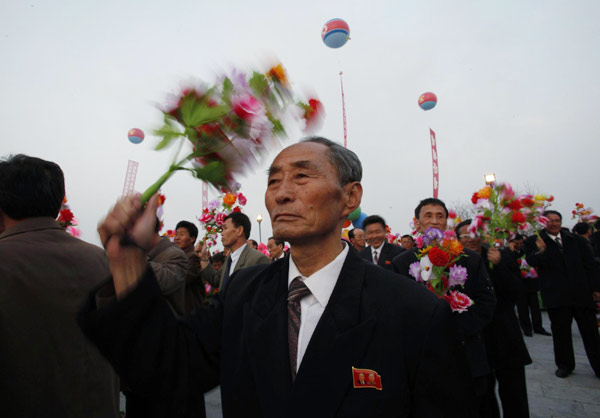
 |
|
Residents attend the unveiling ceremony of the bronze statues of the late founder of the Democratic People's Republic of Korea Kim Il-sung and Leader Kim Jong-il in Pyongyang April 13, 2012. [Photo/Agencies] |
WASHINGTON -?The United States on Friday confirmed that it will not go forward with the food aid deal with the Democratic People's Republic of Korea (DPRK), following Pyongyang's failed satellite launch earlier the day.
The United States has "made clear that we could not go forward with that type of agreement if they could not keep their commitments, and their efforts to launch a missile clearly demonstrates that they could not be trusted to keep their commitments," White House deputy national security advisor Ben Rhodes said aboard Air Force One.
"Therefore, we're not going forward with an agreement to provide them with any assistance," he told reporters while traveling with US President Barack Obama.
The statement came after the DPRK confirmed that the earth observation satellite launched earlier on Friday morning failed to enter orbit.
In a deal announced on February 29, the DPRK agreed to impose a moratorium on nuclear tests and long-range missile launches and allow international nuclear inspectors to return to the country. In return, the United States agreed to provide the country with 240,000 tons of food aid.
Last month, the DPRK announced that it will launch in April an "earth observation" satellite, or the Kwangmyongsong-3, using a long-range rocket to mark the 100th birthday of its late leader Kim Il-Sung.
The UN Security Council on Friday deplored the satellite launch by the DPRK, which violates Security Council resolutions prohibiting the country from conducting launches that use ballistic technology, Susan Rice, the US ambassador to the United Nations who holds the rotating council presidency for April told reporters.
During the briefing, Rhodes also expressed the US concerns about the possible nuclear test by the DPRK.
"In the past, the North Koreans have tended to pursue patterns of provocative actions to include missile launches, nuclear tests as they undertook in 2006, 2009," Rhodes said.
He warned of tighter sanctions and more pressure on the DPRK if it continued to take "additional provocative actions."